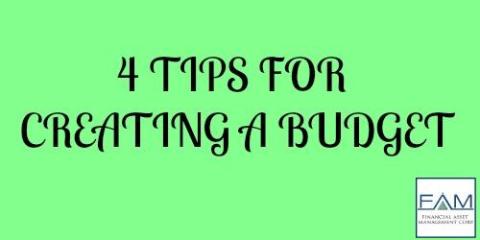
4 Tips for Creating a Budget
The vast majority of individuals go through life without paying much attention to the flow of their finances. Most people know how much they make and ensure that their bills are paid, but how do you look at your budget? Do you know how much you spend on certain activities, such as entertainment, groceries, and gas? When you create a budget, it becomes significantly easier to track your spending and get ahead on your finances. In this post, you'll find four tips to help create a budget.
Identify Your Spending Habits
You'll want to start by taking time to look at how you spend your money. The first thing to do is look at your past three months of pay stubs from work. This will provide you with a baseline on your income, allowing you to accurately estimate how much money enters your account each month.
Then you can move on to look at your expenses. An easy way to do this is to gather your household utility bills (water, sewer, cable, gas, etc.) and look at your online credit card statement. Most financial institutions offer graphs and charts linked to your credit card that generally categorize your monthly spending. This enables you to determine how much money you're spending, and what you're spending it on.
Establish Short-Term Goals
Now that you have a good idea how much you make and where your money goes each month, you can set some short-term goals with your budget. Regardless of the short-term goals you set, whether it's to take a vacation or save money for a down payment on a new home, you need to match those up with your long-term financial objectives.
Figure Out What You Owe
If you're like most Americans, you have debt of some sort. Whether you've purchased a new car or recently graduated from college, you likely owe money to someone. As you create your budget, keep an eye on your debt and figure out which debts you can pay off. Try to focus on paying off your dangerous debt first. For example, it's unreasonable to focus on paying off a home. On the other hand, credit card debt can likely be paid off and is smart to tackle now because most credit cards have high interest rates on debt carried from month to month.
Make Adjustments
As you follow the guidelines you've established with your budget, you'll need to make adjustments from time to time. As you pay off debt, for example, remove it from your spending categories and determine where that additional "income" can go. Will you divert it to savings, or spoil yourself with more money for entertainment and leisure? The choice is yours. However, try not to let money previously devoted to debt bloat your spending in other areas each month.
With a budget in hand, you'll be able to keep accurate track of your income and expenses from month to month. A good budget will help you control short-term expenses to meet your long-term financial goals to save money for retirement, the purchase of a new home, or a well-deserved vacation.


